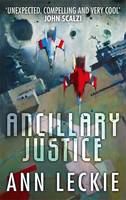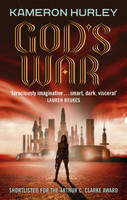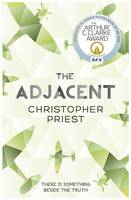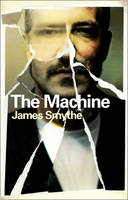This year, the Arthur C. Clarke Award received a record 121 submissions, which set the stage for an exciting shortlist and debate. However, my initial feeling about the actual shortlist was that it felt a bit… well, unadventurous; it wasn’t going to stretch anyone’s idea of science fiction (something which the Clarke often does, and which I value it for), didn’t seem to have benefitted from the uniquely broad view of the field that the Clarke enjoys. Of course there’s no reason in principle that a shortlist focused on core genre can’t be a good shortlist; now I’ve read the books, however, I can’t help feeling that the titles on the periphery of the shortlist should be at its centre, and the titles at the centre of the shortlist shouldn’t be there at all.
 I’ve been going back and forth, trying to decide which one of two shortlisted books I’d jettison first; in the end, there’s so little to choose between them that I may as well call it a tie for last place. Listing the two in alphabetical order means I start with The Disestablishment of Paradise by Phillip Mann. This is the story of a scientist taking a final sojourn on the planet of Paradise as its human colony is dismantled, and uncovering the secrets of its strange ecology. Mann’s novel feels curiously old-fashioned to me, and is scuppered by its terrible treatment of gender (‘What fools we women are sometimes!’ thinks the protagonist at one point; there are many more examples). This goes right down into the heart of the text, and overshadows what interest there may be in its ecological themes.
I’ve been going back and forth, trying to decide which one of two shortlisted books I’d jettison first; in the end, there’s so little to choose between them that I may as well call it a tie for last place. Listing the two in alphabetical order means I start with The Disestablishment of Paradise by Phillip Mann. This is the story of a scientist taking a final sojourn on the planet of Paradise as its human colony is dismantled, and uncovering the secrets of its strange ecology. Mann’s novel feels curiously old-fashioned to me, and is scuppered by its terrible treatment of gender (‘What fools we women are sometimes!’ thinks the protagonist at one point; there are many more examples). This goes right down into the heart of the text, and overshadows what interest there may be in its ecological themes.
Also bringing up the rear of the shortlist for me is Ramez Naam‘s Nexus, named for an experimental drug which links human minds. Like Mann’s book, Nexus gives its female characters a poor deal, mostly sidelining them or otherwise using them as adjuncts to its male protagonist. The novel also has its weaknesses structurally: though there are moments when Nexus reflects on the implications of its titular drugs, these are largely drowned out by a humdrum thriller plot that doesn’t do the book’s ideas justice.
 Ann Leckie‘s Ancillary Justice – a thundering space opera with an AI-protagonist whose consciousness once spanned a gestalt of spacecraft and human auxilliaries, and is now confined to a single human body – has been a very popular book. I’ve seen effusive praise for it, and also some more lukewarm reactions; I’m in the latter camp. Leckie sets out some interesting territory to explore, such as issues of colonialism and gender (the protagonist defaults to using the pronoun ‘she’ for all characters, which gives the novel a distinctive texture); but, again, it feels to me as though the adventure plot is holding everything back.
Ann Leckie‘s Ancillary Justice – a thundering space opera with an AI-protagonist whose consciousness once spanned a gestalt of spacecraft and human auxilliaries, and is now confined to a single human body – has been a very popular book. I’ve seen effusive praise for it, and also some more lukewarm reactions; I’m in the latter camp. Leckie sets out some interesting territory to explore, such as issues of colonialism and gender (the protagonist defaults to using the pronoun ‘she’ for all characters, which gives the novel a distinctive texture); but, again, it feels to me as though the adventure plot is holding everything back.
Now to the second – and, to my mind, more successful – half of the shortlist. The Adjacent is pretty much a distillation of Christopher Priest’s individual creative vision, so what you think of it will largely depend on whether you like Priest’s work in general. I do, and I like The Adjacent: yes, there are issues with the book (particularly around its treatment of gender and the depiction of a British Islamic republic); but it also contains what I found to be the single most affecting sequence in the entire Clarke shortlist (at heart, The Adjacent is a love story), and its portrayal of bleeding realities is bracing stuff for the imagination. I don’t think that The Adjacent quite reaches the heights of Priest’s previous Clarke-winning The Separation, but it’s a considerable work all the same. I just think there are two other novels on the shortlist which are even more fully realised than this.
 Action-adventure sf tends to be the poor relation when it comes to the Clarke, so it’s nice to find an example on the shortlist that feels as though it can hold its own. God’s War by Kameron Hurley comes tearing off the page with its protagonist, a no-nonsense female bounty-hunter, and its vividly depicted background of a centuries-long war on a planet with insectile technology. Issues of faith, gender, and the body combine in a novel whose adventure aspects complement its ideas, giving them room to breathe and flourish.
Action-adventure sf tends to be the poor relation when it comes to the Clarke, so it’s nice to find an example on the shortlist that feels as though it can hold its own. God’s War by Kameron Hurley comes tearing off the page with its protagonist, a no-nonsense female bounty-hunter, and its vividly depicted background of a centuries-long war on a planet with insectile technology. Issues of faith, gender, and the body combine in a novel whose adventure aspects complement its ideas, giving them room to breathe and flourish.
In some ways, James Smythe‘s The Machine is a very different book from God’s War, its almost claustrophobic calmness and intimate canvas worlds away from Hurley’s widescreen action. But I do think the two novels share an intensity of focus and a facility for dramatising their concerns. If I prefer The Machine over God’s War, it is really only because my personal taste runs more towards the quieter sort of novel than to action-adventure; I couldn’t place one novel ahead of the other in terms of how well each embodies and achieves its own project. That’s why I would be most happy to see either Smythe or Hurley take the Clarke when it is announced next Thursday.



 If there’s one thing you can be sure of with a
If there’s one thing you can be sure of with a 
 The Vintage Classics edition of this novel really seems to have taken off in the UK these last few months; I wasn’t too surprised to see that it was the next choice for one of my book groups. It chronicles the life of one William Stoner, who is born into a Missouri farming family, but ends up a professor of literature. After his death, Stoner is not much remembered, let alone celebrated; John Williams then explores the quiet dramas that make up such an ‘ordinary’ life.
The Vintage Classics edition of this novel really seems to have taken off in the UK these last few months; I wasn’t too surprised to see that it was the next choice for one of my book groups. It chronicles the life of one William Stoner, who is born into a Missouri farming family, but ends up a professor of literature. After his death, Stoner is not much remembered, let alone celebrated; John Williams then explores the quiet dramas that make up such an ‘ordinary’ life.
 The spine of this novel reads: ‘The Deep Whatsis by Peter Mattei is the bastard love-child of Bret Easton Ellis and Chuck Palahniuk. Eric Nye is a character you’ll either love or hate. Probably hate.” Well, I feel somewhere in between the two extremes towards him, so there.
The spine of this novel reads: ‘The Deep Whatsis by Peter Mattei is the bastard love-child of Bret Easton Ellis and Chuck Palahniuk. Eric Nye is a character you’ll either love or hate. Probably hate.” Well, I feel somewhere in between the two extremes towards him, so there.
Recent Comments